Two months after the White House invited 50 heads of state to Washington for the first U.S.-Africa Leaders Summit on Aug. 4-6, observers on both continents are asking, “What did the summit achieve, and how will any gains made be leveraged?” USIP asked several prominent Africans who have worked with the Institute over the years for their reflections.
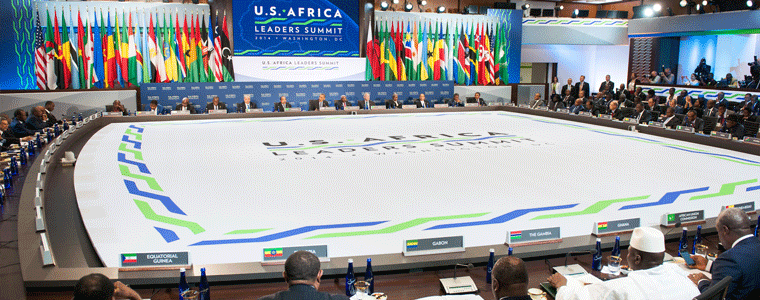
Opinions are predictably mixed, though they lean positive. The summit attracted significant coverage in the U.S. and international media, though only sometimes featuring Africans’ perspectives on the event, which zeroed in on topics of trade, investment, security and governance. In addition to the event’s achievements, we asked our colleagues how it was perceived in their country and what needs to happen next in order for any achievements and momentum to be sustained. Their answers appear below.
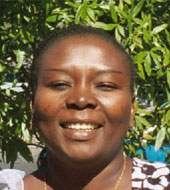 Delphine K. Djiraibe
Delphine K. Djiraibe
Human Rights Lawyer
N'Djamena, Chad
For me the U.S.-Africa Leaders summit was a big storm in a little glass of water. It has given opportunities to African head of states to be welcomed by president Obama, the leader of the world. They expected to get credit, and balance a little bit critiques of their poor record in democracy and good governance in the public opinion.
In Chad it was really "un non evenement" [a non-event] as people are concerned with their daily life (access to food, to clean water, to electricity, to health care, to sanitation…). People see the participation in international summits as a waste of public funds, while the majority of people are dying of poverty.
It was shocking for the Chadian population to see that a president who stayed in power for 23 years over rigged elections, and who did not hesitate to liquidate, arrest and harass opposition leaders, members of the national assembly, human rights activists and journalists, could be invited by a country known as the most democratic in the world.
President Obama should use his power to urge African leaders to promote democracy, change into power, good governance and human rights. Development and business must be for the benefit of people first.
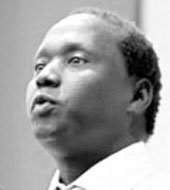
Dr. Jok Madut Jok
The Sudd Institute
Juba, South Sudan
The U.S.-Africa summit that the U.S. President Barack Obama convened in August 2014 was received with mixed feelings all across Africa. It was seen as recognition of the importance of Africa in global economics, trade, investment and global security on the one hand, and giving a pass to corrupt leaders who have failed their own people in governance, human rights and service provision, on the other hand. The question of bad governance was particularly an issue of major concern for citizens in countries that are experiencing massive political turmoil and violence, such as South Sudan.
As seen in social media commentaries and other online forums, many people in South Sudan understood the purpose of the summit as a way to strengthen and broaden America’s longstanding historical and political ties to Africa. But there were voices suggesting that the summit was intended to counter China’s increasing importance and expanding trade relations with Africa. Others said that it was mostly about Obama and very little to do with Africa, about his legacy and his signature initiatives -- Power Africa, Trade Africa etc., all of which do not really cover much territory in Africa.
But what did South Sudanese and other East Africans say about the conduct of the summit and its outcome? Much of the reflection and discussions within South Sudan and in online debates among the diaspora focused on security and peace issues related to the civil conflict in the country and on issues of U.S. foreign investment in the young state.
On the first, many people who support the armed rebellion in the country saw the warm welcome to President Salva Kiir, especially the welcome speech given by Secretary of State John Kerry, as the U.S. ignoring the role of the president [Kiir]in the killing and mayhem that have engulfed the country since mid-December 2013. They expected or wished that President Obama had used this opportunity to warn Kiir against the consequence of continued violence for South Sudan and for U.S.-South Sudan relations. They did not get any of that, and for them the summit produced nothing.
The supporters of [Kiir’s] government saw this as a triumph of democracy and the legitimacy of an elected president over the leaders who want to change government by use of violence. For them the summit was useful in supporting the status quo.
On whether the summit benefited South Sudan in any way, it seemed that no South Sudanese were holding their breath, given that the U.S. does not seem to have much leverage in the resolution of the conflict at the moment, which is the most important matter of concern for South Sudanese.
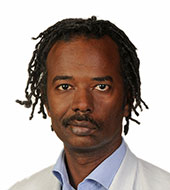 Arif Elsaui Omer
Arif Elsaui Omer
Journalist based in Nairobi and Khartoum
Former USIP Sudan Youth Leader
I was particularly interested in the U.S.’s agenda, and what it had pre-determined as the nature of partnerships sought with African countries. I hoped that having engaged a specific caliber of leaders by invitation to the summit, the U.S. had affirmed its readiness to build relationships of equal value to both continents.
I therefore expected that subsequent discussions on partnerships would demonstrate a holistic understanding of issues of concern to African countries, in addition to building trade and investment. For instance, discussions between U.S. and East African countries would include issues related to Somalia and South Sudan to some extent, due to the effect of conflict and instability in these countries on the implementation of the region’s agenda.
Further, I expected that the discussions would extend to how to enable such countries to adapt best practices in terms of governance, democracy and human rights, amongst others. That is, the summit would provide a platform to establish strategies or plans to engage the currently excluded countries, with the aim of mitigating any effects on implementation and enabling them to attain the level of best practices required to be partners within the region.
Recognizing that countries such as Somalia and South Sudan would have an impact on the implementation of any agenda in the region, the summit might have sought means to engage with these issues towards enabling the region to proactively mitigate potential threats to any partnerships on trade and investments.
The summit seemed to hold the promise of more equal relationships and partnerships, coming at an opportune time to develop strategies and plans. However, it only partially rose to its potential, when considered in light of other activities within the East African region.
For instance, over a period of one month, three high-level meetings tackling issues including terrorism, conflict, security, money laundering, immigration, weapons trade and drug trafficking were held in Kenya. Collectively, they brought together delegations from over 40 countries, including heads of intelligence and security agencies, members of the African Peace and Security Council, ministers of internal security and police commissioners.
These meetings affirmed the region’s interest and capability to collaborate on key issues, complimentary to existing frameworks such as the African Union (AU), the Common Market for Eastern and Southern Africa (COMESA) and the (Intergovernmental Authority on Development (IGAD). These present a foundational mechanism through which partnerships can be built with the regionand with specific countries.
While the U.S.–African Leaders Summit was a commendable step towards better partnerships between the U.S. and African countries, both continents could accrue greater benefits if the wealth of investment in existing partnerships and collaboration structures by African countries could be leveraged.
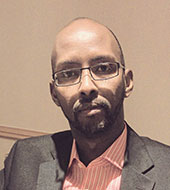 Daud Osman
Daud Osman
Senior Researcher
The Heritage Institute for Policy Studies
Mogadishu, Somalia
Overall, the individuals I interviewed have somewhat a positive perception on the U.S.–Africa Leaders Summit, and believe that it has achieved a great deal. However, the key issue that the Summit achieved has to do with the change in U.S. perception towards Africa as a troubled continent that poses a significant risk to U.S. investment. Thus, the summit signaled the U.S. government’s commitment to start a new relationship, based on mutual respect and has the potential to advance the shared interests and priorities of both U.S. and African countries.
The summit also addressed many of the key priorities of African States such as security, investment and institutional capacity building. Many Somalis are very happy with the summit outcome, as it included new initiatives to support the African Union peacekeeping effort in Somalia. It also included a new partnership for the counter terrorism effort in Somalia.
On Sept. 1, 2014, U.S. drones killed Ahmed Abdi Godane, Al-Shabaab’s leader, which many Somalis reacted to positively and even predicted the downfall of Al-Shabab, since he was considered a ruthless leader who eliminated some of his close friends who questioned his brutality and forced others to leave Al-Shabab to create a parallel group.
Both the U.S. and African leaders should work together to implement the outcomes of the summit. However, to achieve the objective of the summit, the U.S. must be frank with the African leaders to change the status quo by creating the capacity and the conditions necessary to achieve successful results. As an example, the theme of the conference was “Investing in the Next Generation,” which is vital to improving security and sustainable economic growth, as close to 70 percent of the African population is less than 35 years old.
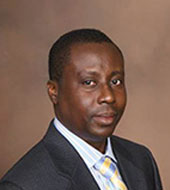 Dr. Franklin Oduro
Dr. Franklin Oduro
Head of Research and Programs and Deputy Director
Ghana Centre for Democratic Development
Without a doubt, the summit was significant. It seems to have re-invigorated the U.S.-Africa relationship, particularly in the area of economic development. The fact that it provided the space to discuss and explore investment opportunities for Africa was critical -- forging a partnership that is focused on placing the prosperity of Africa’s future generation at the center of the global discussion.
Prior to the summit, news about it generally received publicity and hype across all media platforms, although the discussion could at best be described as mixed. On the one hand, some Ghanaians saw the summit as an opportunity for the country to scale up U.S. interest in Ghana’s socio-political and economic development, considering the relationship that exists between Ghana and the United States; some even saw the summit as a possible platform for the country to gain some relief from deficit pressures and exchange rate misalignments that had caused some economic unrest through the second Millennium Challenge Account (MCA) compact. On the other hand, the perception surfaced that the summit would be another “talk shop” that would virtually not yield any result.
The summit should not end up being another “talking shop.” A coordinated approach to ensure continuous engagement on key issues discussed with these African leaders who participated in the summit is pertinent, particularly as they affect growth and development. There is the need for clear and established goals that will be pursued by both partners.
For Ghanaians, expectations following the summit will be the realization of the desires and wishes for more investment, proper implementation, sound fiscal policy control and an improvement of the productive capacity of the domestic economy. With respect to the second MCA compact that Ghana has been successfully implementing, adherence to transparency and accountability in use of funds are necessary for investment impact.